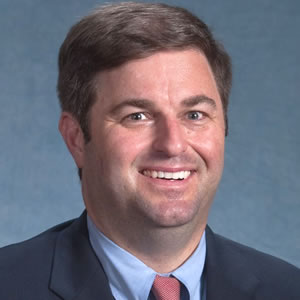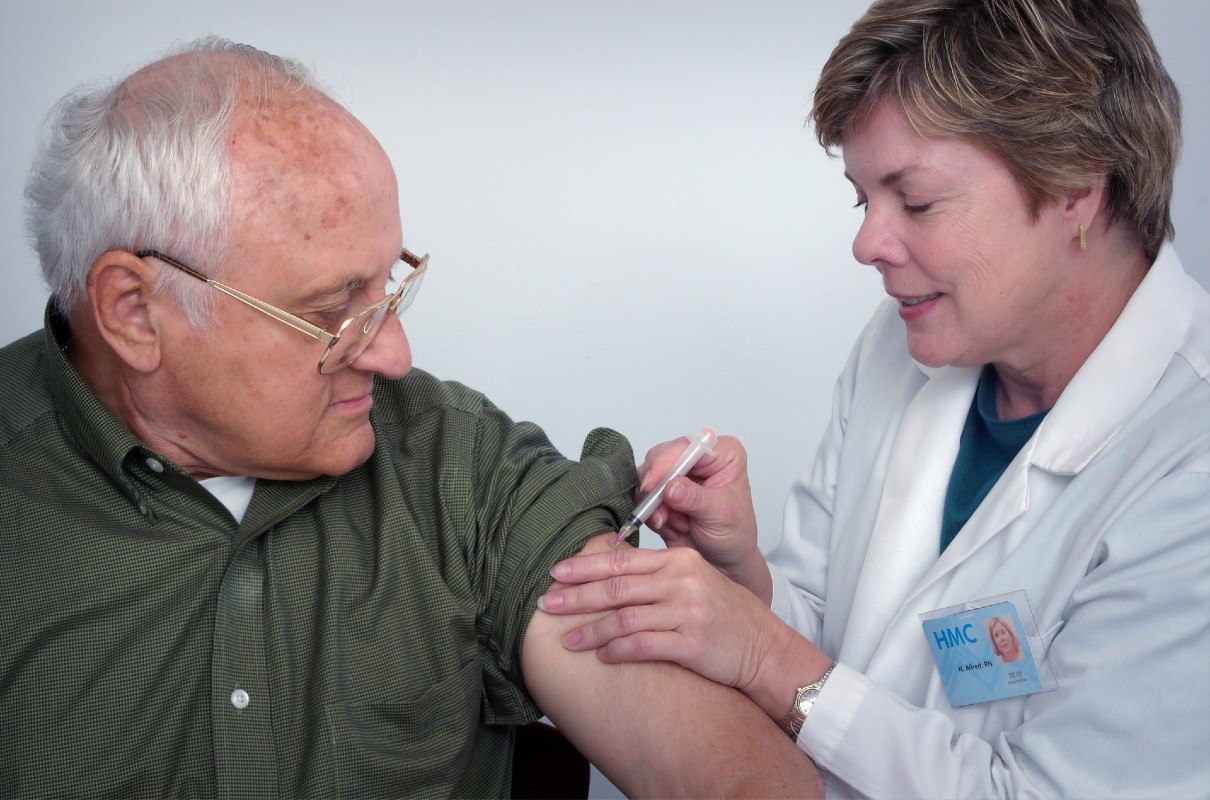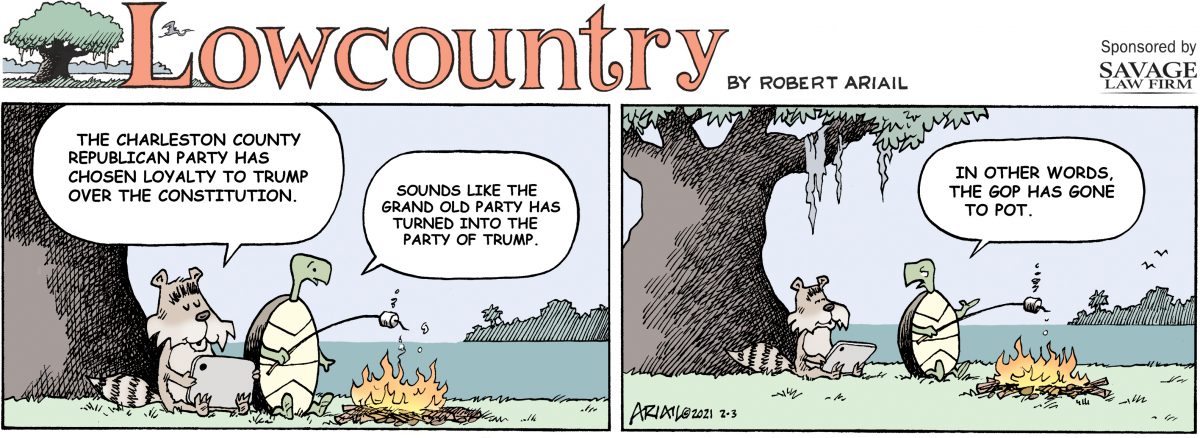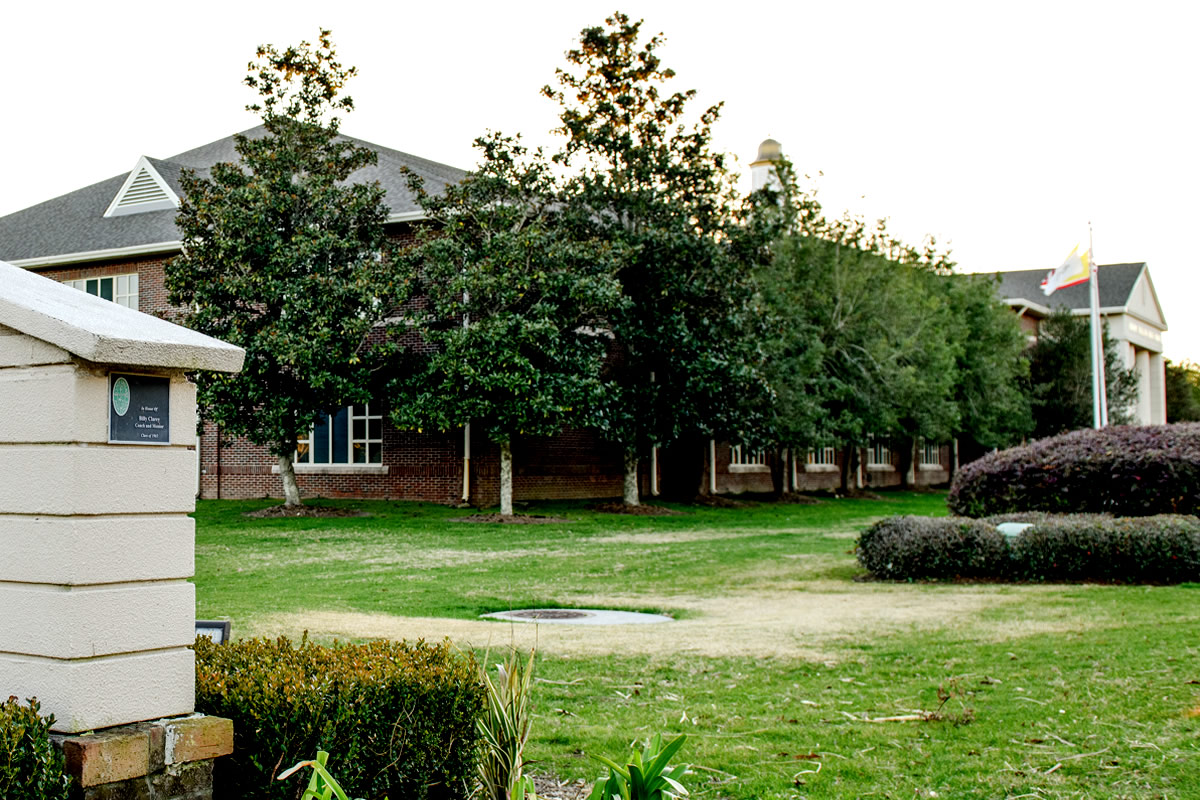STATEHOUSE REPORT | ISSUE 20.06 | FEB. 5, 2021
BIG STORY: Teachers get pay love from House before Valentine’s Day
NEWS BRIEFS: State changes how it calculates COVID-19 positivity rate
LOWCOUNTRY, Ariail: GOP has gone to POT
COMMENTARY, Brack: Lawmakers need to ask right questions on Santee Cooper
SPOTLIGHT: Charter Communications
MY TURN, Keck: Become a climate advocate to help ducks, wildlife
FEEDBACK: On billboards, Hank Aaron
MYSTERY PHOTO: Brick building
Teachers get pay love from House before Valentine’s Day

By Skyler Baldwin, special to Statehouse Report | Members of the S.C. House of Representatives unanimously passed a joint resolution Tuesday to reinstate an annual teacher pay increase by spending $50 million from the state’s Contingency Reserve Fund for the 2020-2021 school year. The bill, H. 3609, now heads to the state Senate.

“Unfreezing and funding the step increase is keeping a promise to teachers and the right thing to do,” said Sumter GOP Rep. Murrell Smith, chairman of the House Ways and Means Committee. “The pandemic has hit South Carolina hard, but our teachers have continued to work helping our students through these difficult circumstances.”
S.C. lawmakers suspended step increases last fall when school started due to pandemic-related budget concerns, but leaders promised they would review the decision in January.
“I’m very excited that the overwhelming majority of fellow House members agreed to take care of promises made for all of our teachers across the state by putting the step increase in place,” said freshman S.C. Rep. Mark Smith, R-Berkeley. “Our teachers and administrators are all doing the very best they can to educate our children during these challenging times.”
State Rep. Gil Gatch, R-Dorchester, said he also was thrilled about the bill’s passing, particularly the retroactive lump sum provision. And, he isn’t the only one. “Representatives wanted to get that money to the teachers as fast as possible and as easy as possible,” he said.
Raises will boost morale, teachers say
The renewed step increase resolution isn’t the first time teachers and advocates have depended on state lawmakers to fulfill promises of higher pay for South Carolina educators. Public school teachers and state workers rallied in 2019 at the state capitol in Columbia to persuade lawmakers to provide higher pay and increase education funding.
“This helps our already tight budgets, and the fact that lawmakers, administrators and teachers are all on board with this is a great step forward,” said Matthew Fuentes of Mount Pleasant. “This is something that’s great to see.”
Fuentes, who teaches at Beckham High School in Mount Pleasant, said he believes the coming together of many different people rallying behind teachers is a result of the pandemic. “It’s been made clear what teachers do every day — how hard the job is, how important student achievement is and how important it is for students to be in school.”
Advocacy groups for teachers applauded the resolution.
“We think it’s a really important piece of legislation to address the growing teacher shortage in South Carolina,” said Patrick Kelly, director of government affairs for the Palmetto State Teachers Association. “It addresses some of the morale issues teachers are facing due to the experiences they’ve had over the last 12 months due to the pandemic.”

Sherry East, president of the S.C. Education Association, agreed.
“The SCEA is thrilled and grateful that the House has honored their commitment to making the step increase a priority at the beginning of the session,” she said. “We hope the Senate will move quickly and we can get this money in the hands of our teachers.”
Morale issues, advocates say, are the leading cause of teachers leaving the field as well as the lack of incoming teachers as well. However, the work is far from done for teachers in the state.
“To see administrators, teachers and lawmakers all on the same page is a good first step,” Fuentes said. “But, asking or wanting more — is that still on our minds? Absolutely. If you look at where our state’s salaries rank next to the rest of the country, of course it’s still on our minds.”
Fuentes also cites teacher turnover rates as a problem. The state is losing educated and motivated teachers because they can’t live on the salary they are being paid, he said. According to reports from last November, more than 50 teachers had resigned since the start of the fall semester, and the trend has only continued.
Other proposals may be fairer to veteran teachers
Some advocates say the step increase, an average of 2 percent per teacher, is welcome and appreciated, but isn’t the solution for some teachers in the state. According to the measure, the state-issued increase bumps salaries for teachers every year up to 23 years. Teachers who have worked longer than that are ineligible for the raise.
“That’s why we have advocated for either increasing the steps or at least including a [cost-of-living adjustment], so that all faculty would be able to see some slight increase over last year’s compensation,” Charleston Teacher Association Director Jody Stallings said.
“Teachers are grateful for the $500 bonuses given earlier this year,” he said. “But, experienced teachers will be disappointed when the retroactive increases are applied and they are left out.”
Some legislators agree that more can be done for teachers beyond the step increases. Mark Smith, for example, told Statehouse Report that his focus is moving toward vaccinations for educators.
“Educators are exhausted and overwhelmed right now,” East said. “Knowing the step increase is on its way to reality is a ‘step’ or move in the right direction.”
Skyler Baldwin is a staff writer for the Charleston City Paper, which published an earlier version of this story. Have a comment? Send to: feedback@statehousereport.com.
State changes how it calculates COVID-19 positivity rate

Staff reports | State health officials this week announced a change in the way they will calculate the percentage of positive COVID-19 tests.
Ten months into the pandemic, officials said the reformed calculation brings the state in line with others and is a better measure of spread. But slightly lower positivity rates that result should not be used as indicators that COVID-19 poses any less of a risk in the state.
On Thursday using the new calculation method, the S.C. Department of Health and Environmental Control reported 1,649 new confirmed cases from 23,653 individual tests, making 10.1 percent of tests positive. Last week, rates were reported at more than 20 percent.
“It is important that people understand that while percent positive appears as a smaller number under the new way of calculating the rate, COVID-19 continues to spread at an elevated level in our state. That smaller number is solely based on the change in the way we calculate the rate,” said state epidemiologist Dr. Linda Bell, in a statement on Tuesday. Learn more about the recalculation method.
In related news, Gov. Henry McMaster and the state Senate are bickering over whether to give seniors or teachers priority for getting COVID-19 vaccines. The governor said he might veto a Senate effort to steer shots to teachers. More. DHEC said Wednesday South Carolina residents meeting the age requirement of at least 65 years old, regardless of health status or preexisting conditions, can schedule appointments starting Monday.
In other recent news:
![]() Senate confirms Simmer as new DHEC director. The South Carolina Senate confirmed Dr. Edward Simmer, a retired military doctor, Thursday to be the new director of the state’s beleaguered health and environmental agency. More: AP News
Senate confirms Simmer as new DHEC director. The South Carolina Senate confirmed Dr. Edward Simmer, a retired military doctor, Thursday to be the new director of the state’s beleaguered health and environmental agency. More: AP News
Huge port deal gets limits. State legislators have agreed to send a proposed deal to borrow $550 million for Port of Charleston infrastructure improvements to the full Senate for consideration, but only after adding a series of financial controls. More: The Post and Courier
Abortion ban gets House hearing. About 50 South Carolina residents testified in person and online on Wednesday at a House subcommittee hearing in what was likely the final chance for people to speak on the proposed abortion ban recently passed by the Senate. More: AP News
$300 million lawsuit alleges voyeurism at Bishop England. A $300 million lawsuit filed by former GOP state Sen. Larry Richter against Bishop England High School and the Catholic Diocese of Charleston seeks tuition refunds and damages for every child who might have been seen through a window peering into students’ locker rooms. More: Charleston City Paper.
- Have a comment? Send to: feedback@statehousereport.com.
GOP has gone to POT

Here’s a new cartoon by Robert Ariail that first was published in our sister newspaper, the Charleston City Paper. Love it? Hate it? What do you think: feedback@statehousereport.com.
Lawmakers need to ask right questions on Santee Cooper

By Andy Brack, editor and publisher | Embarrassed by creating a controversial law that allowed utility companies to charge customers for projects that were not complete, the General Assembly wants to make it all go away.
 So they essentially got rid of the 2007 Base Load Review Act after two power companies, the private SCE&G and the public Santee Cooper, suffered the humiliating failure in 2017 of a $9 billion project to build a nuclear plant in Fairfield County. Since then, a Virginia company swept in to take over SCE&G and its parent, SCANA, and Santee Cooper became the legislature’s favorite whipping boy.
So they essentially got rid of the 2007 Base Load Review Act after two power companies, the private SCE&G and the public Santee Cooper, suffered the humiliating failure in 2017 of a $9 billion project to build a nuclear plant in Fairfield County. Since then, a Virginia company swept in to take over SCE&G and its parent, SCANA, and Santee Cooper became the legislature’s favorite whipping boy.
And now the General Assembly has thrown out a $14 million study on what to do next — sell Santee Cooper to a private company, let a private company manage it or reform the utility from within. Why? Apparently because leaders, blinded by the gods of privatization, didn’t like what the report said. So they’ve decided to change the rules and rush pell-mell down a shiny new, unexplored path to figure out what to do with Santee Cooper.
This is the height of arrogance. It illustrates how the conversation that’s been boiling isn’t really about electricity and South Carolina ratepayers. Instead, it’s about the legislature’s lust to beat its chest and show how it has power and knows better than anyone else.
Too many state lawmakers aren’t asking the right questions about future rates, control, debt and past performance of the players. Too many still enchanted by failed trickle-down economics seem deaf to anything other than privatization is best, regardless of consequences.
So here are just a few things to question:
Rates. While wonks at a pro-privatization think tank published a report denigrating Santee Cooper’s rates, they used the wrong figures (egg on face) — numbers from a cooperative, not Santee Cooper. A real comparison of rates for the average residential customer shows Santee Cooper’ rates are “clearly the lowest” compared to the for-profit utilities currently serving the state. Question: If an out-of-state company buys the non-profit Santee Cooper, do you really think it will lower rates to pay the $21 million salary of the private company’s top executive?
Control. South Carolinians, for better or worse, control Santee Cooper because it’s a public asset. But if it’s sold to a private company, South Carolinians will cede major control of what can be done. Question: What’s the advantage of losing control of a state asset that an overwhelming majority of ratepayers like?
Debt. Santee Cooper’s debt expanded by $4 billion after the nuclear deal failed. As of the end of 2020, its total debt was $6.8 billion, but a restructuring by new management has been paying off debt early. Santee Cooper’s opponents argue that S.C. ratepayers or citizens are liable for that debt. But the debt for the leading suitor to privatize Santee Cooper, NextEra Energy, was more than $47 billion in October. Questions: Do you really think NextEra’s debt will go down if it purchases Santee Cooper? Do you really think NextEra will shift the debt to shareholders and not ratepayers in South Carolina?
Past performance. NextEra recently tried to buy a Jacksonville, Fla., utility for $11 billion, a deal that has led to multiple investigations and media headlines like, “NextEra Energy’s failed attempt to purchase JEA highlights web of murky spending, lobbying.” Questions: With slick pieces of direct mail denigrating Santee Cooper now showing up in S.C. mailboxes paid for by unknown sources, is there any possibility that consultants, lobbyists, lawyers and well-paid marketing gurus are relentlessly attacking Santee Cooper in an orchestrated effort to influence lawmakers in South Carolina’s opaque political environment? Isn’t what’s happening an all-out underground campaign to poison the reputation of Santee Cooper so a company can buy the utility on the cheap?
One Santee Cooper retiree we know is disgusted about how the valued — and valuable — state utility is being raked over the coals after implementing internal reforms that are working.
“South Carolinians created this situation and South Carolinians can and are fixing this situation,” he said, adding that if you think it makes sense to transfer Santee Cooper to an outside behemoth, “you are sadly mistaken.”
Andy Brack is editor and publisher of Statehouse Report. His column also is published in the Charleston City Paper, Florence Morning News, Greenwood Index Journal, The (Seneca) Journal, Camden Chronicle Independent and Hartsville Messenger. Have a comment? Send to: feedback@statehousereport.com.
Charter Communications
 The public spiritedness of our underwriters allows us to bring Statehouse Report to you at no cost. Today, we’re happy to shine the spotlight on Charter Communications, the nation’s fastest-growing TV, internet and voice company. Committed to integrating the highest quality service with superior entertainment and communications products, Charter is at the intersection of technology and entertainment, facilitating essential communications that connect 24 million residential and business customers in 41 states, including South Carolina. In addition to being committed to giving back to the communities we serve, the bedrock of our business strategy is to serve our customers and exceed their expectations.
The public spiritedness of our underwriters allows us to bring Statehouse Report to you at no cost. Today, we’re happy to shine the spotlight on Charter Communications, the nation’s fastest-growing TV, internet and voice company. Committed to integrating the highest quality service with superior entertainment and communications products, Charter is at the intersection of technology and entertainment, facilitating essential communications that connect 24 million residential and business customers in 41 states, including South Carolina. In addition to being committed to giving back to the communities we serve, the bedrock of our business strategy is to serve our customers and exceed their expectations.
“We, at our core, are a service organization,” President and CEO Tom Rutledge says. “And every product we sell has a huge service component.”
- To learn more, visit Charter’s South Carolina services online.
Become a climate advocate to help ducks, wildlife

By Jay Keck, special to Statehouse Report | Any duck hunter knows the familiar comfort of the cool morning air and the quiet stillness of the water as the dawn light sparks the babbling of ducks arriving for the winter.

Duck hunting is a proud tradition for South Carolinians and something we look forward to all year! With the 2020-2021 waterfowl season closing at the end of last month, many will tell you things aren’t the same as they used to be. Hunters are particularly in tune with nature. When you go out day after day to spend time in nature and are surrounded by wildlife, you pick up on little changes from year to year that others may miss – migratory species showing up later and later, flowers blooming earlier and an increase of flooding changes our ecosystems. So what’s making things different now? The same thing that’s affecting so many other communities, ecological processes and habitats across the country: climate change.
Like many plants and animals, birds’ life cycles and behaviors are closely linked with the changing seasons. For ducks, geese and other migratory waterfowl, changes in weather as well as changes in day length help tell birds when they should begin their long flights southward in the fall and back northward in the spring. Temperature and precipitation affect the timing and availability of the food these birds need once they reach their final destinations. And year after year, they tend to follow relatively consistent patterns in their habitat ranges and migration timing.
But now, warming temperatures in the northern stretches of the Atlantic Flyway have upset the migratory process for ducks and other animals. Hunters like me have noticed that they simply don’t come south in the numbers they used to. Climate change is increasing the frequency and intensity of some natural disasters, including flooding. Sea level rise is causing changes to the wetland habitats as fresh and brackish marsh is replaced by less diverse salt marsh and open water. Loss of vegetation from these changes can also affect the ducks that depend on these areas for food while migrating and wintering on coastal waters.
As someone who has seen these shifts firsthand, it’s time for my fellow sportsmen and women to advocate on behalf of the wildlife we love. To help ducks adapt to the changing climate, we must protect the wetland habitats they rely on. Local governments should not allow developers to fill in wetlands and then build there. This not only destroys duck habitat, but also exacerbates flooding issues in surrounding areas. Long-term management plans are needed which take climate change into account and address resiliency if we want to improve the outlook for waterfowl in the future.
With the 117th Congress now beginning its work, addressing climate change impacts to our state’s wildlife legacy and our outdoor economy should be a top priority. We need our newly elected and re-elected leaders to deliver our message to Washington or risk seeing our most cherished traditions and the economic benefit that they bring vanish.
Keck, habitat education manager at the S.C. Wildlife Federation, is a South Carolina native who graduated from the College of Charleston. Have a comment? Send to: feedback@statehousereport.com.
On pesky billboards
![]() To the editor:
To the editor:
Love Ariail’s cartoon. We may never get rid of billboards, but we can try to outlaw electronic ones. They are a distraction to driving, much less SAFE driving.
I hope I wrote a letter in opposition several years ago. I praise Mount Pleasant for banning digital billboards. They should go the way of the dodo!
— John Hart, Columbia
Aaron was his hero, too
To the editor:
Hank Aaron was my hero, too.
Growing up in Atlanta in the 1950s, my hero was Mickey Mantle…but when the Braves and Hammerin’ Hank arrived in Atlanta in 1966, my loyalties quickly switched to Mr. Aaron.
I , like Robert Kittle, was not aware of the ugly resentment and harassment Aaron faced until years after he became baseball’s home run king. Had I known as a young man, I would have admired him all the more. Years later, I went to school in New York City where I had the opportunity to meet Mantle, but alas, I never had the honor of meeting my real hero, Hammerin’ Hank. He will be missed.
— Dr. Jake Podber, Charleston
Aaron was “The Natural”
To the editor:
In 1971 I graduated from college, but I had grown up about two miles from Forbes Field [in Pittsburgh], so my hero in the 1950s and ‘60s was Roberto Clemente (who did not like the prejudice he faced). I got to see Aaron, Mays, Matthews, Frank Robinson, Sandy Koufax, Don Drysdale, Bob Gibson, Warren Spann, Maury Wills++. They were all National Leaguers – and all in their prime. Clemente would throw out runners 9-3 from right field if they didn’t hustle to 1st. And most folks stopped at second, on a single to right/Clemente – or fear being gunned down at 3rd. And Roberto was a crazy bad-ball hitter.
The ‘50s and ‘60s were a great time to watch baseball. Thanks for the reminder article. I have to agree the “best gentleman” of all of the above was Hank Aaron! He looked effortless in how he played the field and how he batted. Hank was The Natural.
— Tom Leonard, Charleston
Send us your thoughts
We love hearing from our readers and encourage you to share your opinions. But to be published, you’ve got to provide us with contact information so we can verify your letters. Letters to the editor are published weekly. We reserve the right to edit for length and clarity. Comments are limited to 250 words or less. Please include your name and contact information.
- Send your letters or comments to: feedback@statehousereport.com
Brick building

Here’s a brick building that may or may not have been in South Carolina news in recent days. What and where is it? Bonus: Why might we use this as a photo this week? Send your guess to feedback@statehousereport.com — and remember to include your name, home city and contact information.
 Last week’s mystery, “Close-up mystery,” is what we think of the House of Aaron — Atlanta-Fulton County Stadium where slugger Hank Aaron broke Babe Ruth’s home run record in 1974.
Last week’s mystery, “Close-up mystery,” is what we think of the House of Aaron — Atlanta-Fulton County Stadium where slugger Hank Aaron broke Babe Ruth’s home run record in 1974.
While several readers incorrectly guessed Columbia’s Williams Brice Stadium, let’s hand out hearty kazoos to those who correctly identified the close-up: Kevin Mertens of Greenville; George Graf of Palmyra, Va.; Ross Lenhart of Stone Mountain; Ga.; Frank Bouknight of Summerville; Allan Peel of San Antonio, Texas; Elizabeth Jones and Jay Altman, both of Columbia; Randy Herald of Lexington; and Bill Segars of Hartsville.
Peel provided some additional information about the old stadium: “the original Fulton County Stadium was the primary venue for hosting the various baseball games during the 1996 Summer Olympics. Then, after the Olympics and the 1996 World Series ended, the Olympic Stadium was converted to a baseball park, renamed to Turner Field, and re-opened in 1997. Plans were in place to demolish the Fulton County Stadium and convert it to a parking lot for the new Turner Field.
“In an attempt to save the Fulton County Stadium from demolition, some attempts were made to get the authorities to consider recommissioning the stadium to be a professional soccer arena. Sadly, this proposal failed and the inside of the Fulton County Stadium was demolished between 1996 and 1997. The exterior of the stadium was then imploded on August 2, 1997, and converted to a parking lot for Turner Field.”
- Send us a mystery. If you have a photo that you believe will stump readers, send it along (but make sure to tell us what it is because it may stump us too!) Send to: feedback@statehousereport.com and mark it as a photo submission. Thanks.
 ORDER NOW: Copies are in Lowcountry-area bookstores now, but if you can’t swing by, you can order a copy online today.
ORDER NOW: Copies are in Lowcountry-area bookstores now, but if you can’t swing by, you can order a copy online today.
ABOUT STATEHOUSE REPORT
Statehouse Report, founded in 2001 as a weekly legislative forecast that informs readers about what is going to happen in South Carolina politics and policy, is provided to you at no charge every Friday.
Meet our team
- Editor and publisher: Andy Brack, 843.670.3996
- Special correspondent: Lindsay Street
Donate today
We’re proud to offer Statehouse Report for free. For more than a dozen years, we’ve been the go-to place for insightful independent policy and political news and views in the Palmetto State. And we love it as much as you do.
But now, we can use your help. If you’ve been thinking of contributing to Statehouse Report over the years, now would be a great time to contribute as we deal with the crisis. In advance, thank you.
Buy the book
Now you can get a copy of editor and publisher Andy Brack’s We Can Do Better, South Carolina! ($14.99) as a paperback or as a Kindle book ($7.99). . The book of essays offers incisive commentaries by editor and publisher Andy Brack on the American South, the common good, vexing problems for the Palmetto State and interesting South Carolina leaders.
More
- Mailing address: Send inquiries by mail to: P.O. Box 21942, Charleston, SC 29413
- Subscriptions are free: Click to subscribe.
- We hope you’ll keep receiving the great news and information from Statehouse Report, but if you need to unsubscribe, go to the bottom of the weekly email issue and follow the instructions.
- Read our sister publications: Charleston City Paper (every Wednesday) | Charleston Currents (every Monday).
- © 2021, Statehouse Report, a publication of City Paper Publishing, LLC. All rights reserved.


